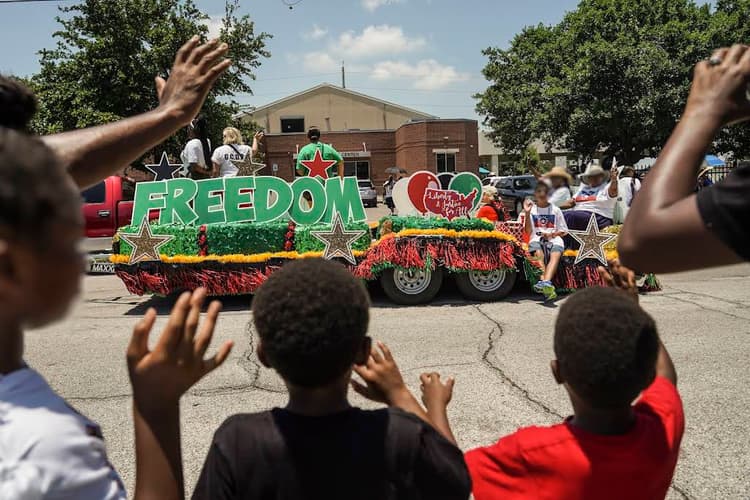Freedom Days: Commemorating the Ongoing Struggle for Freedom
Zoe Green
8 min read
Listen to this study note
Study Guide Overview
This study guide covers the end of legal enslavement in the United States, focusing on the Emancipation Proclamation, Thirteenth Amendment, and slavery in Indigenous nations. It explores the significance of Juneteenth, including its origins in Texas, General Order No. 3, and its evolution as a Freedom Day and federal holiday. The guide also provides practice questions and exam tips for the AP African American Studies exam.
#AP African American Studies: Freedom Days Study Guide ✊🏾
Hey! Let's get you prepped for the AP exam with this super-focused guide. We're diving into Freedom Days, especially Juneteenth, and how they connect to the bigger picture of African American history. Think of this as your cheat sheet for tonight! Let's do this!
#
End of Legal Enslavement
#
Emancipation Proclamation and Thirteenth Amendment
-
Emancipation Proclamation (1863):
- Issued by Lincoln as a wartime measure. 💡
- Freed enslaved people in Confederate states still in rebellion.
- Didn't apply to border states (Missouri, Kentucky, Maryland, Delaware) that remained in the Union.
-
Thirteenth Amendment (1865):
- Permanently abolished slavery in the entire U.S. (except as punishment for a crime).
- Freed four million African Americans, a huge chunk of the South's population.
- A major first step toward freedom, but not the end of the struggle.
-
Important Note:
- The Thirteenth Amendment did not address the nearly 10,000 African Americans enslaved by Indigenous nations.
Think of the Emancipation Proclamation as a limited release movie (only in some states), and the Thirteenth Amendment as the wide release (everywhere in the US).
#Slavery in Indigenous Nations
- "Five Civilized Tribes": Cherokee, Chickasaw, Choctaw, Creek, and Seminole nations practiced slavery.
- These nations adopted some European customs, including slavery, which led to this name.
- 1866 Treaties: U.S. government negotiated to end slavery in Indian Territory.
- However, freed African Americans were not granted tribal citizenship. 🙁
- This created a complex situation for both African Americans and Indigenous peoples.
The term "Five Civilized Tribes" is ironic, as it was used by white Americans to describe Native American nations who adopted European customs, including the inhumane practice of slavery.
#
Significance of Juneteenth
#Juneteenth Origins in Texas
- June 19, 1865: Union General Gordon Granger read General Order No. 3 in Galveston, Texas.
- Informed enslaved people in Texas they were free. 🎉
- Texas was the last Confederate state to get the news.
- General Order No. 3:
- First document to mention racial equality through "an absolute equality of personal rights and rights of property between former masters and slaves".
- Set the stage for the ongoing fight for equal rights.
Remember the date: June 19, 1865. It's the core of Juneteenth, and it's an easy point to remember!
#Freedom Days in African American Communities
- Long History: African American communities have celebrated Freedom Days for a long time.
- Example: July 5, 1827, in New York.
- Juneteenth: One of many Freedom Days, each marking a milestone in the fight for equality.
- Other examples: Emancipation Day in D.C. (April 16) and Eighth of August in Kentucky and Tennessee.
- Federal Holiday (2021): Juneteenth became a federal holiday, recognizing its importance in American history. 🇺🇸
#Early Juneteenth Celebrations
- Celebration of Freedom: Newly freed people gathered to celebrate their freedom.
- Included singing spirituals, wearing new clothes, feasting, and dancing.
- New Clothing: Symbolized a break from the dress codes of slavery.
- Other Names: Also known as Jubilee Day and Emancipation Day.
#Commemorations of Juneteenth
- Honoring Ancestors: Recognizes the vital roles ancestors played in ending slavery.
- Resilience and Determination: Celebrates the strength of African Americans in embracing freedom and fighting for equal rights.
- Community Joy: Highlights the importance of seeking joy and validation within their own communities.
- Reflection and Commitment: Provides a time for reflection and renewed commitment to racial equality and justice.
Think of Juneteenth as a combination of a birthday party (celebration) and a family reunion (honoring ancestors) with a serious undertone (commitment to justice).
#Required Sources
#General Order 3, issued by Maj. Gen. Gordon Granger, 1865
"The people are informed that in accordance with a Proclamation from the Executive of the United States, all slaves are free. This involves an absolute equality of personal rights and rights of property, between former masters and slaves, and the connection heretofore existing between them, become that between employer and hired labor. The freed are advised to remain at their present homes, and work for wages. They are informed that they will not be allowed to collect at military posts; and that they will not be supported in idleness either there or elsewhere."
- Key Points:
- Officially proclaimed emancipation in Texas.
- Marked the effective end of slavery in the U.S.
- Foundation for Juneteenth.
- Recognition as a federal holiday in 2021 solidified its significance.
#Juneteenth Celebrations

Juneteenth Celebration in West Philadelphia, 2019

Juneteenth Celebration in Louisville, 2021

Juneteenth Celebration in Galveston, 2021
- Commemorations:
- Mark the emancipation of enslaved African Americans.
- Pivotal moment in U.S. history.
- Cultural preservation and community building.
- Maintain connections to heritage while addressing current issues.
- Fosters intergenerational dialogue and collective memory.
Don't confuse the Emancipation Proclamation with the Thirteenth Amendment. The Proclamation was a wartime measure, while the Amendment was a permanent constitutional change.
#Final Exam Focus
- High-Priority Topics:
- The Emancipation Proclamation vs. the Thirteenth Amendment.
- The significance of Juneteenth and General Order No. 3. - Freedom Days in African American communities.
- The complexities of slavery in Indigenous nations.
- The ongoing fight for racial equality.
- Common Question Types:
- Multiple Choice: Expect questions that test your knowledge of dates, key figures, and the impact of historical events.
- Short Answer: Be prepared to explain the significance of Juneteenth and its role in African American history.
- Free Response: You might be asked to analyze the impact of emancipation on different groups (e.g., formerly enslaved people, Indigenous nations).
- Last-Minute Tips:
- Time Management: Quickly scan questions and prioritize those you know best.
- Common Pitfalls: Don't overthink simple questions. Be sure to read the question carefully and answer what is being asked.
- Strategies: Use your knowledge of key terms and concepts to guide your answers.
When you see a question about the impact of a historical event, always consider the perspectives of different groups. This will give you a more complete and nuanced answer.
#
Practice Question
Practice Questions
#Multiple Choice Questions
-
Which of the following best describes the immediate impact of the Emancipation Proclamation? (A) It freed all enslaved people in the United States. (B) It freed enslaved people in Confederate states still in rebellion. (C) It granted citizenship to all formerly enslaved people. (D) It established a system of reparations for formerly enslaved people.
-
What is the significance of General Order No. 3 in the context of Juneteenth? (A) It officially ended the Civil War. (B) It declared the end of slavery in all U.S. territories. (C) It informed enslaved people in Texas that they were free. (D) It established the first federal holiday celebrating emancipation.
-
Which of the following is NOT a typical component of early Juneteenth celebrations? (A) Singing spirituals (B) Wearing new clothing (C) Political protests (D) Feasting and dancing
#Free Response Question
Question: Analyze the significance of Juneteenth as a commemoration of the end of slavery and a celebration of African American culture. In your response, be sure to discuss the historical context of Juneteenth, its evolution over time, and its continued relevance today.
Scoring Guidelines:
-
Historical Context (2 points):
- 1 point for correctly identifying Juneteenth as commemorating the day enslaved people in Texas learned of their freedom.
- 1 point for explaining the connection to General Order No. 3 and the Emancipation Proclamation.
-
Evolution Over Time (2 points):
- 1 point for describing early Juneteenth celebrations (e.g., singing, new clothes, feasting).
- 1 point for discussing how Juneteenth has evolved into a national holiday and a broader celebration of African American culture.
-
Continued Relevance (2 points):
- 1 point for explaining how Juneteenth serves as a reminder of the struggle for freedom and equality.
- 1 point for discussing how Juneteenth is a time for reflection, celebration, and community building.
-
Analysis and Synthesis (1 point):
- 1 point for a well-organized response that connects the historical context, evolution, and continued relevance of Juneteenth.
-
Clarity and Coherence (1 point):
- 1 point for clear, concise writing and effective use of evidence.
Alright, you've got this! Take a deep breath, review this guide, and go ace that exam! You're ready! 💪🏾
Continue your learning journey

How are we doing?
Give us your feedback and let us know how we can improve





